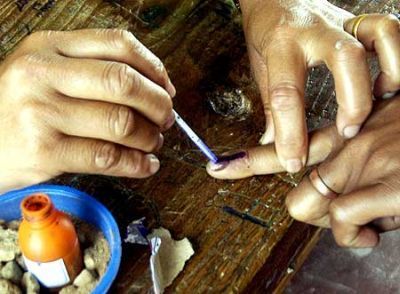 If error margins and confidence intervals are accounted for, even apparently decisive polls are not "sure things" and that brings us to bookies, who don't believe in any "sure things", says Devangshu Datta
If error margins and confidence intervals are accounted for, even apparently decisive polls are not "sure things" and that brings us to bookies, who don't believe in any "sure things", says Devangshu Datta
At the time of writing, the Delhi Assembly elections could yield three results. Some opinion polls give the Aam Aadmi Party a majority in the 70-seat Assembly, while other polls favour the Bharatiya Janata Party. Some "pollsters" have also looked at the illegal betting market. Last time I checked (Friday morning), the bookies were offering 2.5:1 on the BJP and 3:1 on the AAP, with 25:1 on the Congress.
Are the bookies right, or is it likely to be the AAP, or a hung Assembly? Hard to say. Election data and opinion polls are often cited by the statistically challenged. These data are also wilfully misinterpreted by the biased. Few people understand how polls, or bookies, operate.
Opinion polling is a very blunt instrument. First, Indian elections are multi-cornered and first-past-the-post. The pollster must convert vote shares into seats and each pollster usually does that via some proprietary model. This methodology may be very flawed.
Second, Indian electorates are heterogeneous. There are differences in religion, caste and language across voter groups, and these influence voting preferences. There are also the usual differences of rural-urban attitudes, gender, income, age, education, hot-button concerns, etc.
In Delhi, all those differences are accentuated. The metropolis is home to vast numbers of migrants from many states. An opinion poll must accurately reflect those differences. This means that the poll must survey people in the same proportions as the differences. The pollster must not only know the demographics; it must also guess the voting percentages across different groups to do the sampling well.
Let's say the polling is done with great rigour, with the sampling accurately reflecting voter demographics, and it also employs a robust vote-share-to-seat conversion model. There is still inherent error to all statistical approaches. The fine print will have a disclaimer like "error of three per cent with 95 per cent confidence interval".
This means that the pollster is confident (perhaps falsely confident) that if such a poll was conducted 100 times, the results would be within plus/minus three per cent of the stated result around 95 per cent of the time. A cursory look at election data makes it clear that elections are often won with far lower margins in multi-cornered FPTP contests.
Keep the error margins in mind and review the opinion polls. For example, the Economic Times-TNS (ET-TNS) poll surveyed 3,260 voters across 16 Assembly constituencies in the last week of January. It said that the AAP would take 49 per cent vote share, while the BJP would get 43.5 per cent. TNS translated this vote share into the AAP winning between 36 and 40 seats, while the BJP wins 28-32.
Does this poll decisively favour the AAP? Well, at a "plus/minus three per cent" error, the same data could mean the BJP takes 46.5 per cent of the vote, or 40.5 per cent. The AAP could take 46 per cent, or 52 per cent. If the BJP takes 46.5 per cent and the AAP takes 46 per cent, the seat splits change. Around five per cent of the time, outside "confidence interval", the margins of errors may be way higher.
If error margins and confidence intervals are accounted for, even apparently decisive polls are not "sure things" and that brings us to bookies, who don't believe in any "sure things". Bookies' odds minimise losses in worst-case scenarios.
Illegal election betting comes in minimal tranches of Rs 10,000. The short odds on the BJP just mean that people who are prepared to punt multiples of Rs 10,000 on this election are mostly BJP-supporters. Ironically, most of the bookies I know are BJP supporters. But they will be delighted if the BJP does not win this election.
My plumber, who is a migrant from Bihar, says he's voting for AAP. So does the local cab-stand owner - a Sikh. The satta market does not reflect their electoral preferences. But they might just outnumber the number of people prepared to punt Rs 10,000 on an election.












 © 2025
© 2025